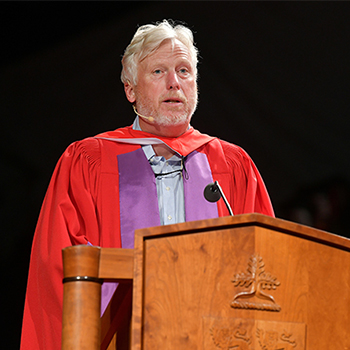David Miller, lawyer, professor, international environmental activist and the former mayor of Toronto, delivered a passionate address to graduands of the Faculty of Liberal Arts & Professional Studies after receiving an honorary doctor of laws degree from York University during the June 16 afternoon convocation ceremony. In his remarks, he focused on the ways that new graduates from public policy, economics, political science and business administration programs could make positive change and right the future, especially when it relates to climate change.
As the managing director of the C40 Centre for Urban Climate Policy and Economy think tank, Miller put his municipal government expertise and knowledge of public policy and the environment to work to bring the mayors of the world’s greatest cities together to make meaningful change to mitigate further damage to climate.
“You can uniquely contribute to addressing one of the defining issues of our time – climate change,” he said, noting that climate change is the result of deliberate economic and public policy choices made in the past, “a choice we can collectively and individually change today.”
Climate change, said Miller, is real; it is man-made and there is an urgent need to address it. “If we do not act immediately to dramatically reduce greenhouse gas emissions, the results will be catastrophic.”
The impacts of galloping climate change can already be seen in delicate ecosystems such as in the Canadian Arctic region with the retreat of sea ice and its effects on numerous species and the people who live in the region. Southern animals are migrating north, and the resident species, such as the polar bear, are suffering. The storms and fires that have ravaged British Columbia, the erasure of the town of Lytton, B.C. in a wildfire are all examples, said Miller, of what climate change looks like.

And yet, he told graduands, “I believe that we will see the change needed to address these issues,” he said, observing that in his lifetime, he has witnessed tremendous progressive change when many thought it was impossible.
“You have the knowledge, the skills and the belief to make a difference today, because climate change at its heart is a matter of economics – public policy, yes, but economics is at its heart,” he said. “And we know this, in part, because of the excellent work of economists at York University who have shown clearly and persuasively that the assumptions behind traditional economics aren’t right, and have set out to show us a different path – ecological economists like Peter Victor, the former dean of environmental studies.
Ecological economists start from a different point because the planet is finite. Growth-based models are unsustainable and these new thinkers, said Miller, are creating an economic revolution. “Instead of asking ‘how do we grow?,’ ask the question ‘how do we create shared prosperity and live within our planetary boundaries?’”
Purposeful, government-led action can create a different path when the planet’s needs are incorporated into decision making and public policy, noted Miller. Global cities are taking significant action, divesting from fossil fuels, building circular economies and more. There is still much work to be done, both collectively and individually, he noted and organizations such as C40, which has more than 1,000 global cities as members, are working to halve emissions by 2030, which is what science says is required to keep the rise in temperatures in check.
“You are already making a difference through your studies and the knowledge you have gained,” he said.
He encouraged graduands to take action by speaking up and responding to employers and organizations with an environmental agenda. He asked graduands to do one thing different that will make a difference in the natural environment. “Walk, cycle or take a bus, give up meat, plant native species, or support an advocacy organization,” he said. “Just do one thing more.”
He asked grads to be political, volunteer, be active and vote. “There is an election this fall, a municipal election,” he said. “In city politics you don’t even have to join a party, just support the candidate who most shares your values.”
He also extolled graduands to take a risk, to pursue roles that can make a difference. “I encourage all of you, when the right times comes, take that risk. It might be today, next year, or like me nearly 15 years after graduating. It doesn’t really matter, so long as you recognize the moment and take the chance. Like me, you will never regret it.”
Originally published in YFile.
